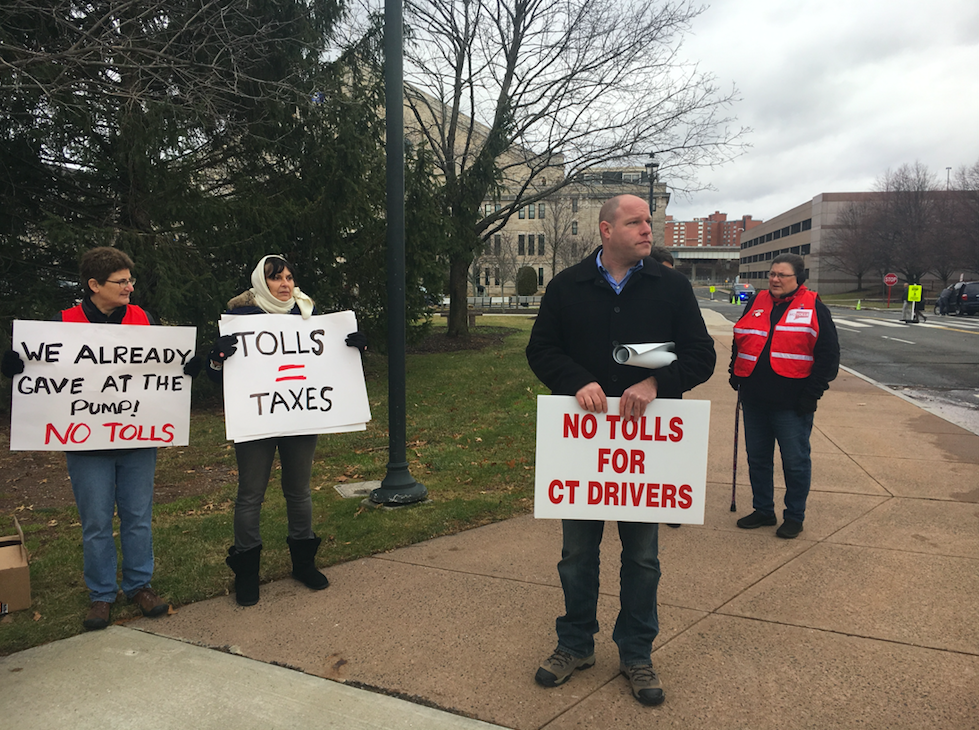For Connecticut drivers who owe toll money to other states, Gov. Ned Lamont’s toll bill says they may finally have to face the music.
According to the tolling bill that passed out of the Finance, Revenue and Bonding Committee, the Connecticut Department of Transportation may enter into reciprocal agreements with other states.
That could mean trouble for some Connecticut residents who owe $5.8 million in unpaid tolls to Massachusetts, according to reports.
Reciprocity means drivers without electronic tolling devices who have their license plate photographed and are mailed a bill could face potential penalties for failure to pay, including fees, withholding license plate renewals and vehicle registrations.
Patrick Jones, president of the International Bridge, Tunnel and Turnpike Association, which lobbies for tolls to fund highways, says reciprocity enables states to share motor vehicle and license plate registration information about out-of-state drivers “with an understanding the other (in-state) agency would apply whatever pressure to that vehicle that they would for a violation on their facility.”
“Most states with tolling have some level of penalty for not paying tolls – ranging from fees to withholding license plate renewals until outstanding debts are paid,” Jones said.
Gov. Ned Lamont has reportedly been meeting with other states to develop reciprocity agreements.
Such agreements can prevent “leakage” – the loss of toll revenue from unpaid tolls – through the threat of fines or penalties, but collecting those unpaid tolls adds to the administrative burden of a tolling system.
Of course, one way to avoid such legal and administrative hardships, is through “interoperability,” an industry term which basically means the ability for different tolling agencies to communicate seamlessly through electronic tolling devices.
“In the case of Connecticut – considering the large footprint of E-ZPass in the Northeast US – one assumes Connecticut would become a member of E-ZPass and issue E-ZPass tags, meaning the state will be instantly ‘interoperable’ with all other E-ZPass issuers,” Jones said.
Lamont and Democratic leaders are using a Connecticut E-ZPass as a means to offer “discounts” to in-state commuters, although it has been pointed out there is nothing preventing out-of-state drivers from obtaining a Connecticut E-ZPass.
Lamont’s tolling bill states, “Any electronic tolling system operated by the department or a toll operator shall be interoperable with all other electronic tolling systems in this state and shall comply with all state and federal interoperability requirements and standards.”
Connecticut marks a dark spot in the Northeast for interoperability — wedged between New York, Massachusetts and Rhode Island which have tolled turnpikes or bridges.
Adding tolls with E-ZPass will make the Northeast coastline interoperable, and IBTTA’s eventual goal is to spread interoperability across the country, according to their website.
According to an article from ITS International, “interoperability has been a high priority on the US tolling industry’s agenda for more than a decade.”
The tolling plans presented thus far all show that Connecticut will have the highest percentage of tolled highway miles in the region — if not the country — as Lamont pushes his plan to toll Connecticut’s three major interstates and Route 15 under the federal Value Pricing Pilot program.
The VPP uses congestion-priced tolling in order to reduce congestion, but the size and scope of the proposals in Connecticut have never been attempted before and it is questionable how much of the plan will be approved by the Federal Highway Administration.
In an effort to gain support among lawmakers and the public, Lamont included a provision in the tolling bill that would lower the gasoline tax by one cent per year for five years if certain toll revenue goals are met.
He has also floated idea of reducing bus fares from $1.75 to $1.00 per ride and a possible income tax credit.
Lamont has said he wants a special session during the summer to pass a tolls bill but, thus far, the General Assembly has remained cool to the prospect and Lamont has been courting Republicans in an effort to gain their support.
Republicans have thus far said they will not support tolling the highways.

